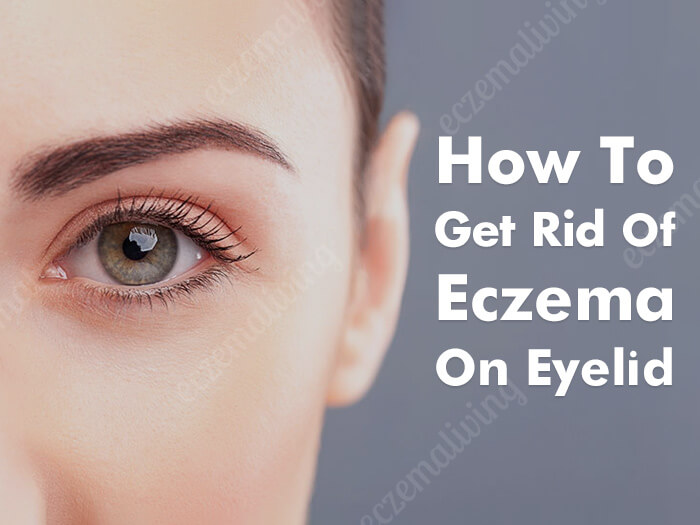Overview Eczema on Eyelid
Are you facing scaly, itchy or dry patches on your eyelids? If yes, then probably you are suffering from eyelid eczema. It’s a medical condition for the skin inflammation, dryness, and itchiness that may occur on the upper or lower eyelids. There is another name for eyelid eczema commonly known as eyelid dermatitis that’s still growing at a faster pace.
Eyelid Dermatitis is most common in the middle-aged women that can be a result of a host of various causes of eczema and may include both internal and external triggers as well. This can make eye makeup look unattractive and may also get your eye skin look wrinkled. In severe cases, the collagen and elastic fibres of the eyes may fracture.
 What Causes Eczema on Eyelids?
What Causes Eczema on Eyelids?
Contact dermatitis can be the main cause and it can be generally categorized into two different categories:
- Allergic Eyelid Eczema
- Irritant Eyelid Eczema
Allergic: A types of eczema caused when your eyes come in a direct contact with the allergens. It can develop when your immune system provides a negative response to a particular substance that comes in direct contact. This is the main reason why your favorite eye makeup causes dry skin. The allergic reaction can arise at any time giving you red, irritated, itchy, flaky and dry skin. In general, allergic contact dermatitis involves 50% – 75% of all eyelid eczema cases and the allergic reaction can last for weeks thus, affecting your skin condition.
Irritant: This particular type can be caused when the skin of eyes touches an irritating substance. The area around the eye will possess stinging, burning sensation, irritation, and dry skin, especially on the upper and lower eyelids.
 What Can be the common culprits for eyelid eczema?
What Can be the common culprits for eyelid eczema?
Makeup and Cosmetics: Women are obsessed with a makeup. The chemical compounds in cosmetics may irritate and initiate an irritant reaction of the eyelids. Few of the common sources from the eye makeup include:
- Mascara
- Eyeliner
- Eyeshadow
- Eye Pencil
- Makeup brushes
- Eyelash curler
- Kohl
Makeup brushes and these applicators can be the main cause for eczema flare-ups. The bristles of the brushes can be made of synthetic materials or animal fur that can initiate an allergic reaction.
Few of the cosmetics those possess metals like lead, nickel, cobalt, and chromium can cause the skin condition making it worse. These are mainly the allergic metals found in mascara, eyebrow pencils and more eye makeup products.
Nails: Yes, not to forget that you are in a direct contact with the allergens through your nails. It can be seen that many people subconsciously touch their eyes throughout the day, bite their nails and this can turn out to be a major cause as well. Eyelid eczema result from simply rubbing or touching the eyes even if a reaction on the fingers, nails or hands are not present.
Exposure to Chemicals: The use of chemical compounds can be found in approximately many daily needs products like cleaners, laundry, air fresheners, skin care products, perfumes, and more. These contain chemicals that can cause an allergic reaction when comes in a direct contact to your skin. The potential triggers like airborne chemicals may trigger your eyelids giving you eczema rashes. Most common chemical exposure include:
- Soaps
- Hair dyes
- Preservatives
- Fragrances
- Chlorine
- Eye drops
 Do You Have These Eyelid Eczema Symptoms?
Do You Have These Eyelid Eczema Symptoms?

If you the one who have rashes on and around your eyes, already suffer from eyelid eczema, then you must be aware of the symptoms associated with the condition.
These generally include:
- Inflamed, red eyelids
- Scaly or flaking skin
- Itching
- Swollen eyes
- Formation of an extra fold of skin on the eyes
 How to Get Rid of Eczema on Eyelid?
How to Get Rid of Eczema on Eyelid?
- Avoid the use of astringent on your eyes
- Avoid using any anti-itch cream on the eyelids
- Use cotton balls to avoid makeup rather than any other fabric
- Avoid using eyeshadow and eyeliner for approximately 4 months as it takes about 4 months to repair your skin barrier function.
- Avoid rubbing and scratching as it can further rupture your skin
- Avoid the use of contact lenses
- Stop using extensions
- In case you need a cleanser then do prefer a mild facial cleanser that is fragrance-free and hypoallergenic
- Use mild moisturizers to your eyelids to avoid any dryness and further worsen the eyelid eczema symptoms.
- Make a few dietary changes and please consult your doctor before taking or avoiding any food item
 How to Treat Eczema on Eyelid?
How to Treat Eczema on Eyelid?
As it can be caused by coming in contact with the allergens so it’s necessary that the masses should keep their eyes clean and avoid scratching, rubbing and touching the areas of eyes too frequently. This can help prevent the growth of infection caused by allergens or irritants. The sufferers should try to identify, avoid contact irritants and treat their condition for an immediate relief:
- Calcineurin inhibitors: It can be used to treat inflammatory disorders, like psoriasis and atopic dermatitis. These can be taken orally or applied as an ointment on the affected skin. It should be used with caution, as it may suppress immune function.
- Moisturization: Don’t forget to moisturize in a regular manner as it can relieve dryness and itchiness. Moisturization can be the best to treat mild eczema conditions.
- Corticosteroids: These are the steroid-based creams that can be applied directly to the eyelids to treat skin inflammation and reduce dryness. It can be taken in tablet form orally and the medication strength particularly depends upon the severity of the symptoms.
See Our More Related Posts:
- Eczema on Lips
- Eczema On Neck
- Eczema On Legs
- Eczema on Face
- Dyshidrotic Eczema Home Remedies
- Itchy Skin Home Remedies
Author Bio:
Shaliza Gill is a Content Writer, Manager, and Developer, producing content, including infographics, websites, and blogs. She has completed her Master of Science in 2013 and has been managing content at Eczema Living since 2015. She coordinates teams of writers, editors, and project managers. Her goal is to produce content that is thoroughly researched, clearly explained, and as helpful as possible to the readers.





